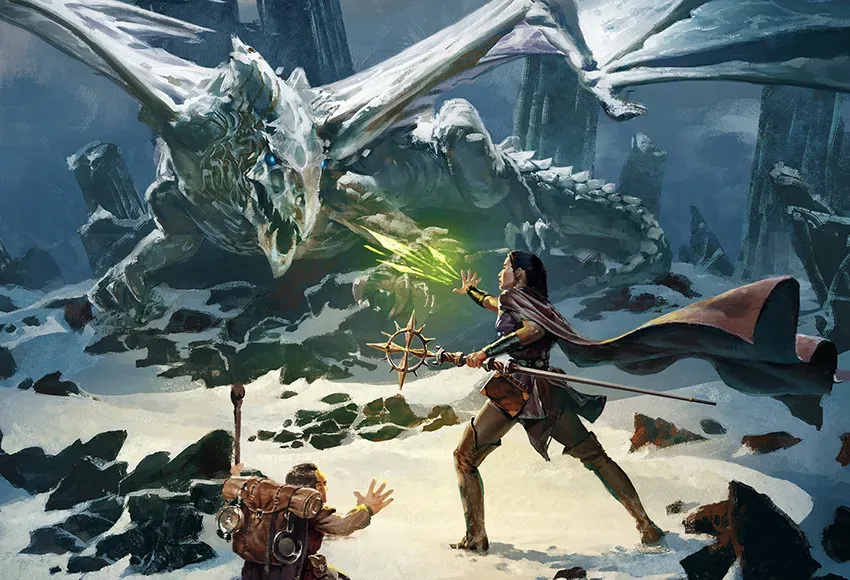For this piece, I wish I had been able to bring up studies about diversity in the tabletop role-playing game (TTRPG) industry specifically. But that industry, despite its rising cultural influence, remains relatively small, and understudied as a result.
Even Wizards of the Coast, the creators of the latest three editions of Dungeons & Dragons (D&D), the most popular TTRPG ever, is only about 1,500 people strong by some estimates – and the majority of that figure is likely dedicated to the Magic: The Gathering trading-card game, which brought in 75% of the company's revenue last year.
All this is to say that few people have a direct hand in creating official content for D&D, and it's not abundantly clear who they are or what that process looks like. Since Wizards is strict about what its employees are allowed to discuss with outsiders, the company's demographics remain something of a black box, with the exception of anonymous employee ratings on company review sites like Glassdoor and Zippia.
To its credit, Wizards' "rank and file" staff are consistently praised on those sites, and it scores a 9.5 out of 10 on diversity on Zippia specifically. Minus a few controversies over the last couple of years, the company's recent products have shown a keener awareness of the harmful tropes the Western fantasy genre often takes for granted.
But the numbers on those review sites aren't particularly reliable, and without a clearer notion of who is working on Dungeons & Dragons and how they go about it, consumers have no concrete way of checking whether Wizards of the Coast is living up to its public promises of diversity, equity, and inclusion – at least, not at the company level.
Lighting up the dungeon
Uncertainty has a way of provoking blanket accusations, and few events generate more uncertainty than a wave of layoffs. In December of last year, Hasbro, the parent company of Wizards of the Coast, announced it would be laying off 1,900 employees, about 20% of its workforce.
That figure would include at least 20 members of Wizards. That's obviously terrible for the people affected, and it was a baffling move considering that Wizards was the only profitable sector of Hasbro in 2023. Many fans have understandably been searching for someone to blame, some calling for a boycott of Wizards products, or of Hasbro more broadly, and others worrying about D&D's future.
But a slim silver lining to this situation, if there is one, is that former employees have been able to speak more openly about their experiences with the company. To learn more about what's Queer at Wizards, I spoke with Eytan Bernstein, who was a senior developmental editor for nearly two years before he was let go in December.
Bernstein's career writing and editing for TTRPGs hasn't ended, though, and it goes back much further than 2022. He has worked with three different editions of D&D over the last 20 years, starting with an online magazine after college. The connections from that gig eventually led to freelance work with Wizards, and finally to a full-time job there.
"From what I could tell, more than half of my department was Queer," Bernstein said. "And that's just the people I knew of. I could be wrong, especially given that there's not the same number of people that were there several months ago. But there were a lot of Queer folk in that department."
Diversity and inclusion in the TTRPG scene overall has seen "tremendous improvement" since the early 2000s, he said, "and that includes Wizards as well."
Bernstein and the rest of the editorial team were constantly working to improve D&D's language and themes regarding race, gender, and sexual orientation. Sensitivity readers are now a requirement for Wizards products, he said, and "people can still request either additional or specific review if they're concerned about an issue related to a particular group or identity, for example. And I've never seen that turned down."
Granted, there is still "tremendous room for improvement." If Zippia's numbers are anything to go by, Black and Indigenous people and women aren't as well represented at Wizards as they might be. Bernstein said that, in addition to hiring for diversity, Wizards should be "hiring people with knowledge of inclusivity and sensitivity beyond simply what their role requires."
Of his coworkers, Bernstein had only good things to say, praising his managing editor Judy Bauer and D&D designer Chris Perkins.
"I know people are frustrated about what was happening with Wizards and Hasbro, but I'd like to emphasize that, whatever you feel about that, it did not involve the people who are working there," Bernstein said. "They're still wonderful, brilliant, dedicated people who want to make good games."


